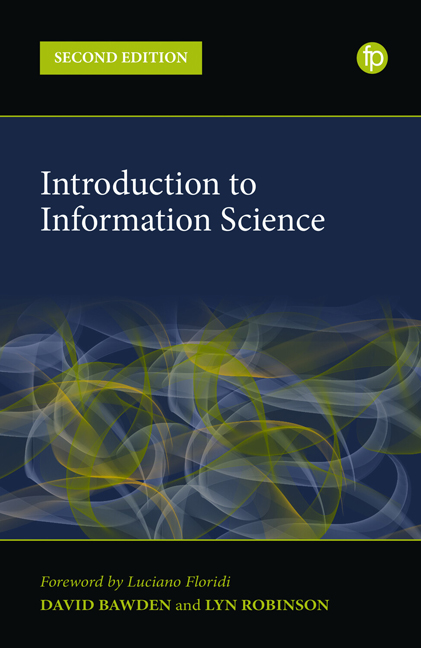Book contents
- Frontmatter
- Contents
- Figures
- Preface
- Foreword – Curators of Semantic Capital
- List of Acronyms
- 1 The Information Science Discipline
- 2 History of Information: the Story of Documents
- 3 Philosophies of Information
- 4 Paradigms, Turns and Theories in the Information Sciences
- 5 Information
- 6 Documents and Documentation
- 7 Domain Analysis
- 8 Information Organisation
- 9 Digital Technologies and Data Systems
- 10 Information Systems
- 11 Informetrics
- 12 Information Behaviour
- 13 Communicating Information: Changing Contexts
- 14 Information Management and Policy
- 15 Information Law and Ethics
- 16 Information Society
- 17 Digital (Onlife) Literacies
- 18 Research in the Information Sciences
- 19 The Future of the Information Sciences
- Additional Resources
- Index
2 - History of Information: the Story of Documents
Published online by Cambridge University Press: 21 April 2022
- Frontmatter
- Contents
- Figures
- Preface
- Foreword – Curators of Semantic Capital
- List of Acronyms
- 1 The Information Science Discipline
- 2 History of Information: the Story of Documents
- 3 Philosophies of Information
- 4 Paradigms, Turns and Theories in the Information Sciences
- 5 Information
- 6 Documents and Documentation
- 7 Domain Analysis
- 8 Information Organisation
- 9 Digital Technologies and Data Systems
- 10 Information Systems
- 11 Informetrics
- 12 Information Behaviour
- 13 Communicating Information: Changing Contexts
- 14 Information Management and Policy
- 15 Information Law and Ethics
- 16 Information Society
- 17 Digital (Onlife) Literacies
- 18 Research in the Information Sciences
- 19 The Future of the Information Sciences
- Additional Resources
- Index
Summary
The written word – the persistent word – was a prerequisite for conscious thought as we understand it.
James Gleick (2011, 37)We describe ourselves as living in an information age as if this were something completely new. In fact, many of our current ways of thinking about and handling information descend from patterns of thought and practices that extend back for centuries.
Ann M. Blair (2010, 1)Introduction
In this chapter we will give some historical context for the rest of the book by looking at the development of recorded information, and the documents which carry it, through time. We will do this only very briefly and informally; there are many detailed treatments of the history of information provision and dissemination, and we will not try to replicate these in any way. We will give some historical perspective on specific topics in several of the chapters which follow.
It is sometimes suggested that, since information science is a relatively young discipline, there is no need to think about the history of anything which came before, say, 1950. We strongly disagree. Some appreciation of the history of information and documents, as well as being of interest in its own right, can help give a perspective on current problems and solutions. Although contexts and technologies may change, many information issues remain constant over time, and a historical perspective can be of practical, as well as academic, value.
Historical studies come in many forms and flavours (Black, 2006). For the information sciences, historical accounts have fallen into a number of categories, including:
• history of libraries, archives and information services
• history of information policies and infrastructures
• history of publishing, books and reading
• history of information technologies (not just digital ones)
• history of the information disciplines and professions
• origins of the information society
• studies of the cultural and social contexts of information communication and use.
The last of these has developed into a new sub-discipline of information history, concerned with all aspects of information in societies of the past; how it was understood, used, organised, managed, collected, disseminated, etc.
- Type
- Chapter
- Information
- Introduction to Information Science , pp. 19 - 44Publisher: FacetPrint publication year: 2022



